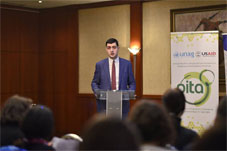
Phobias and Modern Georgia Discussed at Courtyard Marriott
By Mariam Chanishvili
Wednesday, November 29
The conference, Phobias and Modern Georgia, organized by the Peace Foundation and Tolerance and Diversity Institute (TDI) took place in Courtyard Marriott on November 22.
The conference was held within the framework of "Promoting Integration, Tolerance and Awareness" (PITA) implemented by the United Nations (UN) Association of Georgia, with the financial support of the United States Agency for International Development (USAID).
The main goal of the conference was to discuss existing phobiotic attitudes in Georgia to highlight the issue and find ways to solve them.
The conference included three panels: Ethnic, religious, racial phobias in Georgia, Challenges of fighting the hate speech In Georgia and international practice, Media as a tool for fighting phobias and spreading phobias.
The event was opened by Executive Director of the Peace Foundation Giorgi Tumasyan. The conference was moderated by Deputy Executive Director of the Foundation Guliko Macharashvili.
The panels were led by famous journalists, experts, lecturers, including Tamar Kintsurashvili, Executive Director of Media Development Foundation and Ketevan Shubashvili, Head of the Department of Equality of the Public Defender's Office.
The Peace Foundation is a multi-profile think-tank with the aim to achieve the following goals: promote the establishment of peace, spread the culture and values of peace, foster peaceful solution of conflicts, encourage integration processes of Georgia in the democratic world including NATO and the European Union; establish liberal values based on free society in Georgia, strengthen tolerance in Georgia and civil integration, facilitate civic engagement, protect minorities’ rights, encourage minorities to save and develop their culture.
Tolerance and Diversity Institute (TDI) was founded in 2013 with the aim to achieve the following goals: foster religious freedom and tolerance in Georgia; facilitate civic engagement; promote multiculturalism, secular principles and the idea of espousing state neutrality in the field of religion; enhance networking and policy dialogue between religious minority communities and the government; strengthen capacities of religious minority organizations in the field of advocacy and counteraction to discrimination; research and monitor state policy on the protection of minority rights.

